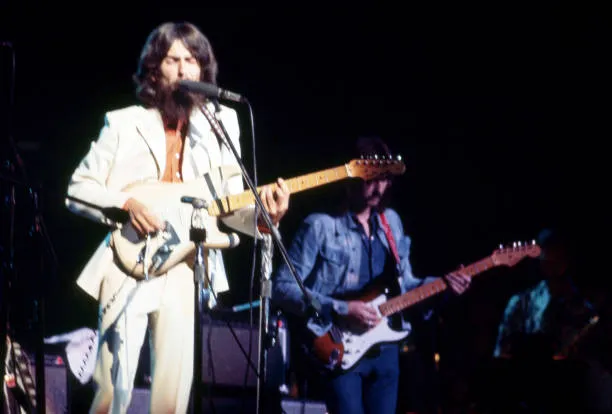The British blues boom of the 1960s was a musical movement that transformed the landscape of popular music. British musicians, inspired by the raw emotion and authenticity of American blues, began to fuse these sounds with rock, creating a new genre that captivated audiences worldwide. At the heart of this revival was Eric Clapton, whose mastery of blues guitar made him a pivotal figure in shaping the British blues-rock sound. His dedication to preserving the blues tradition while pushing the boundaries of guitar playing helped ignite a movement that would define the sound of a generation.

Clapton's Early Immersion in the Blues
Eric Clapton’s fascination with the blues began at an early age. Growing up in post-war England, Clapton discovered American blues artists like Muddy Waters, B.B. King, Robert Johnson, and Buddy Guy, whose music resonated deeply with him. He developed an almost obsessive passion for the genre, amassing an extensive record collection and spending countless hours listening to and emulating these blues legends. Clapton’s dedication to mastering the blues style set him apart from many of his peers. His playing was marked by an authenticity and understanding of the emotional depth that defined the music, earning him early recognition as a guitarist with extraordinary potential.
Rise to Prominence with the Yardbirds and John Mayall
Clapton’s rise to prominence began when he joined the Yardbirds in 1963 as their lead guitarist. While the Yardbirds initially focused on rhythm and blues, Clapton’s influence began to steer the group towards a purer blues sound. It was during his time with the band that he earned the nickname “Slowhand,” a reference to his measured, soulful playing style. However, as the Yardbirds began to shift towards a more commercial, pop-oriented sound, Clapton left the band in search of a deeper connection to the blues.
In 1965, Clapton joined John Mayall & the Bluesbreakers, a pivotal moment in his career. With Mayall, Clapton truly honed his craft, developing a signature blues-rock style that blended the emotional power of the blues with the energy of rock music. His work on the Blues Breakers album, often referred to as the “Beano” album, is regarded as one of the defining moments in British blues history. Clapton’s powerful, emotive guitar playing on this record solidified his reputation as one of the finest blues guitarists of his time.

Cream and the Supergroup Era
In 1966, Clapton co-founded Cream, a pioneering blues-rock trio with bassist Jack Bruce and drummer Ginger Baker. Cream became one of the first supergroups, combining virtuosity, improvisation, and a heavy blues influence. Songs like “Crossroads” and “Spoonful,” both based on traditional blues, showcased Clapton’s ability to take the blues into new, more aggressive territory. Cream’s success was unprecedented, with the band bringing blues-inspired rock to the mainstream in a way that had never been done before. Clapton’s role as the lead guitarist in Cream cemented his status as a global rock star and one of the most influential guitarists of the era.
Influencing the Next Generation of British Guitarists
Clapton’s innovative playing not only captivated audiences but also inspired an entire generation of British guitarists. Young musicians like Jimmy Page, Jeff Beck, and Peter Green were directly influenced by Clapton’s ability to bridge traditional blues with the emerging rock sound. His technique, tone, and emotional expression became a blueprint for aspiring guitarists, leading to the development of the British blues boom that followed in the wake of Cream’s success. Clapton’s pioneering work opened doors for these musicians to explore their own interpretations of the blues, further solidifying the genre’s place in British music history.

Clapton’s Lasting Impact and Legacy
Eric Clapton’s impact on blues-rock and modern guitar playing is immeasurable. Over the decades, he has continued to evolve as an artist, incorporating elements of various musical styles while staying true to his blues roots. His dedication to the blues tradition has kept the genre alive for new generations, and his influence can be heard in countless guitarists who followed in his footsteps. Clapton’s role in keeping the blues relevant in rock music has made him a guardian of the genre, ensuring its legacy endures.

Conclusion
Eric Clapton’s unparalleled status as the “Godfather of British Blues” is well deserved. His early immersion in the blues, rise to fame with the Yardbirds and John Mayall, groundbreaking work with Cream, and lasting influence on generations of musicians have left an indelible mark on rock music history. Clapton’s pioneering contributions not only ignited the British blues revival of the 1960s but also ensured that the genre would remain a vital force in popular music for decades to come.



